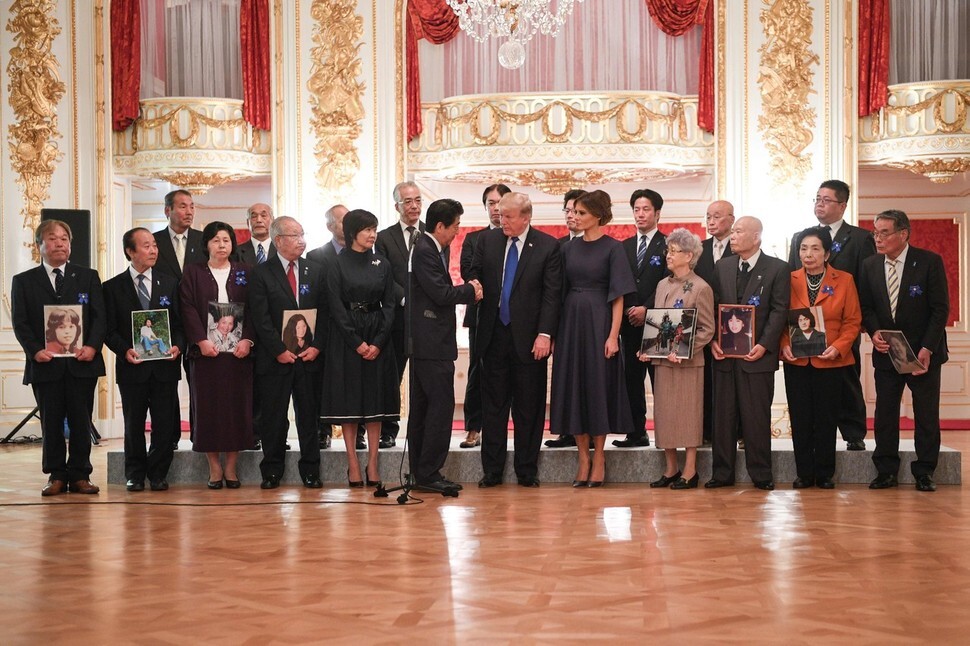hankyoreh
Links to other country sites 다른 나라 사이트 링크
Abe reiterates hardline on North Korea while Trump tones down rhetoric

During the joint press conference that followed his summit meeting with Japanese Prime Minister Shinzo Abe on Nov. 6, US President Donald Trump appeared to tone down his rhetoric, defying expectations by only repeating his standard position on North Korea and its nuclear program. For the most part, it was only Abe who made remarks expressing a hardline stance on the North. While the American and Japanese leaders have been highlighting their warm relations, on this day they displayed a difference of intention on the North Korean solution.
“We completely agreed that, in order to make North Korea change their policy, Japan and [the] US must…enhance the pressure to the maximum level over North Korea,” Abe said during the press conference. “Japan consistently supports the position of President Trump when he says that all options are on the table.”
Remarking that “there is no point in dialogue for the sake of dialogue with North Korea,” Abe said that “now is the time not for dialogue but for applying [the] maximum level of pressure on North Korea. [Nov. 7], there will be a decision of freezing assets of 35 North Korean entities and individuals.”
Abe also said, “I agree with President Trump that we welcome China strengthening her pressure over North Korea, and it is incumbent upon China to play even greater roles,” Abe added.
But Trump did not personally mention China’s role or maximizing pressure on North Korea, two of his regular talking points. After emphasizing that North Korea’s development of nuclear weapons and missiles posed a threat to the entire world, he only said that “the era of strategic patience is over.”
“Strategic patience” was the name of the North Korean strategy developed by the administration of former president Barack Obama, and when Trump announced his new North Korean policy, called “maximum pressure and engagement,” at the end of April, he stressed that his policy was different from that of the Obama administration. Trump’s remark that “the era of strategic patience is over” can therefore be regarded as a routine reference to the Trump administration’s North Korean policy.
Trump even said something that sounded like an excuse for his repeated use of hardline rhetoric against North Korea. “Some people said that my rhetoric is very strong, but look [at] what's happened with very weak rhetoric over the last 25 years,” he said. This implies that his tough rhetoric against North Korea is designed to resolve the North Korean nuclear issue and does not have some other purpose.
After mentioning the family members of Japanese abductees whom he met after the summit meeting, Trump said, “if Kim Jong-un would send [the Japanese detained in North Korea] back...that would be the start of something...very special.” This remark implies that the release of those Japanese could be taken as the starting point for thawing North Korea-US relations.
When asked to clarify a remark he had made on the flight from Hawaii to Japan about North Koreans being “great people,” he repeated the phrase, adding that “They're under a very repressive regime, and…ultimately – I can tell you this – that I hope it all works out.”
When asked about how to avoid an accidental military confrontation in Northeast Asia, Abe said, “No one likes conflicts. I don’t like it; Mr. Trump neither. But North Korea continues its provocations against the international community.”
By Yi Yong-in, Washington correspondent
Please direct questions or comments to [english@hani.co.kr]

Editorial・opinion
![[Editorial] Does Yoon think the Korean public is wrong? [Editorial] Does Yoon think the Korean public is wrong?](https://flexible.img.hani.co.kr/flexible/normal/500/300/imgdb/original/2024/0417/8517133419684774.jpg) [Editorial] Does Yoon think the Korean public is wrong?
[Editorial] Does Yoon think the Korean public is wrong?![[Editorial] As it bolsters its alliance with US, Japan must be accountable for past [Editorial] As it bolsters its alliance with US, Japan must be accountable for past](https://flexible.img.hani.co.kr/flexible/normal/500/300/imgdb/original/2024/0417/6817133413968321.jpg) [Editorial] As it bolsters its alliance with US, Japan must be accountable for past
[Editorial] As it bolsters its alliance with US, Japan must be accountable for past- [Guest essay] Amending the Constitution is Yoon’s key to leaving office in public’s good graces
- [Editorial] 10 years on, lessons of Sewol tragedy must never be forgotten
- [Column] A death blow to Korea’s prosecutor politics
- [Correspondent’s column] The US and the end of Japanese pacifism
- [Guest essay] How Korea turned its trainee doctors into monsters
- [Guest essay] As someone who helped forge Seoul-Moscow ties, their status today troubles me
- [Editorial] Koreans sent a loud and clear message to Yoon
- [Column] In Korea’s midterm elections, it’s time for accountability
Most viewed articles
- 1[Column] The clock is ticking for Korea’s first lady
- 2Samsung barricades office as unionized workers strike for better conditions
- 3[Editorial] When the choice is kids or career, Korea will never overcome birth rate woes
- 4[Guest essay] How Korea turned its trainee doctors into monsters
- 5Why Israel isn’t hitting Iran with immediate retaliation
- 6S. Korea, Japan reaffirm commitment to strengthening trilateral ties with US
- 7Japan officially says compensation of Korean forced laborers isn’t its responsibility
- 8[Editorial] As it bolsters its alliance with US, Japan must be accountable for past
- 9Korea, Japan jointly vow response to FX volatility as currencies tumble
- 10‘Right direction’: After judgment day from voters, Yoon shrugs off calls for change